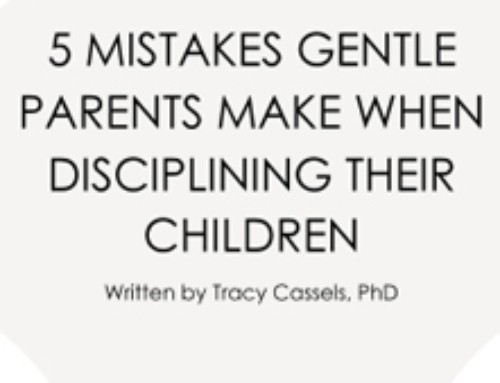 The other week I shared the following story on EP’s facebook page:
The other week I shared the following story on EP’s facebook page:
Last night my daughter asked to watch The Aristocats after we went to the library to take it out. Of course I said yes, but reminded her that afterwards it would be time to get ready for bed. After it ended, she wanted to see it again. I said “no”. She asked again, and again, and again, all met with no’s. Finally she broke down. Full on tears and telling me that she wanted the movie.
I realized in that moment it was one where many parents would drag their kid upstairs, kicking and screaming most likely, and say that was that. I didn’t. I sat with her. I told her I understood that it sucked when you couldn’t watch something you want. I hugged her. After about 5 minutes she asked to nurse and I said yes. She calmed down while nursing. Then she asked one more time and again, I said no.
She then told me, “Don’t worry, I’m not angry. I’m frustrated” (though it may have sounded more like “fustated”). I again told her I understood and then explained why too much TV, especially before bed, isn’t a good idea because of how it affects the brain. Not sure how much she understood but she tried to argue that the movie would help her stomach. But she accepted and then we played for a bit. Then we went upstairs, got ready for bed, cuddled, and slept.
This morning she woke up and started talking about it. She said she was frustrated when she wanted to watch her movie. She asked if she made me frustrated last night and I said no, not at all. She told me I made her frustrated. I said I was sorry (and I am, I know I have to do it as a parent, but it doesn’t mean I like it) and then she said, “That’s okay. I love you.”
When I have moments like these, I honestly don’t understand why anyone could choose to make a stressful situation more intense and frustrating by dragging their child away, upset, to become more upset. I honestly don’t.
While many people appreciated the story for what it was – a moment – some accused me of being judgmental; fine, I’ve been called that before and don’t particularly care. The comments that spoke to me were of those who mentioned their own struggles and how they were implementing, or trying to implement, gentle parenting with no such results.
To those I have one thing to say: It wasn’t always this easy.
It really, honest-to-goodness wasn’t. I have not-so-distant memories of my daughter getting upset, me trying to calm her, her screaming and running away from me (usually upstairs), refusing touch, refusing comfort, and all around refusing everything. In those moments it took everything in me to follow her while staying relatively close but giving her the space she needed and not commenting except to tell her I understood she was sad/angry/frustrated and I was there when she was ready. Sometimes it took two minutes, sometimes ten. Our record was just shy of an hour (you can imagine how much I needed a glass of wine after that encounter), but in the face of these consistently frustrating moments, I tried to remind myself that this was a marathon, not a race, and that what I was doing was (hopefully) going to be better in the long run.
Finally, she would come to me (she always would), we would cuddle, nurse, and just generally calm down. This was the time where I felt it was okay to talk about what happened and offer either alternatives for the future or explain why she couldn’t have/do/say what she had that led to her being upset. I knew, based on neurological and moral development, that trying to reason in the moment was fruitless. When a child’s brain (well, anyone’s but children’s are particularly prone to this) is firing away in the midst of strong emotions, they simply can’t pay attention to what someone is saying to them. They may hear the words, but internalizing the message is damn-near impossible. Therefore, if you want your child to learn from a moment, trying to reason with them or even explain what was wrong won’t get you anywhere unless your child has calmed. (Notably, it’s also fruitless to wait too long. By this I mean, waiting a day or so to talk. Children struggle to make the connections when they are too far apart.)
We also used logical consequences sometimes when it was necessary and always implemented in the way I’ve outlined here (which is quite different from the more popular view of logical consequences), but we never punished. Some times were harder than others; for example, when my stepson was home with us (half the time) because trying to help one child do homework, for example, while another is melting down isn’t easy. But we all learned to make it work – even if it was my husband taking my stepson upstairs to focus on work while I stayed with our daughter or even me giving my stepson a few minutes off to see if we could get my daughter calm before he resumed.
Some would argue that my stepson shouldn’t have had to bear any consequence of my daughter’s behaviour and this is where a swift spank or manhandling her to another room would be necessary. I disagree. Sometimes my daughter has to bear consequences for her brother’s behaviour and she certainly has to give up a lot of time she would rather be playing with us or being loud when he does his homework each day that he’s with us. She does it graciously most of the time and when she doesn’t, we know she’s on emotional overload so we step back and help her. More than that, in our house we focus on the fact that all of us sometimes have to step aside for the benefit of someone else, and those times are more frequent when we’re dealing with someone smaller because they simply aren’t as independent or capable as us older folks are. As my daughter has aged, she has learned to take the back seat more and more, but when she was younger, she didn’t at all because her developmental stage required her to be cared for non-stop, something we explained to my stepson as he had to adapt to taking the back seat every once in a while. Now she steps back when others are in need and the number of times she puts her wants aside for the benefit of others continues to grow. Is it perfect? Absolutely not, but she’s 3 so it shouldn’t be. In fact, is it ever, even for adults?
(I feel it’s worth mentioning that the idea that my stepson shouldn’t bear any consequence for a much younger sibling would actually be instilling in him the idea that no one else matters but himself, a lesson some people have decided is fair for younger children and babies to learn but not our older children and adults. And then they wonder why these older kids feel so entitled…)
All this is to share that this incident wasn’t how things have always been. It wasn’t always this easy. And yet we continue to see the effects grow. One day I imagine it will be easier for her to inhibit that behaviour right from the start, but I know developmentally she’s not there yet. I know most kids that show this type of obedience do it out of fear of the punishment that will inevitably come. I don’t know that they do it out of respect for the other people involved and that is the type of restraint I’m hoping to instill in my daughter. It has been hard work sometimes and it’s nice to see it start to pay off now and know our own actions aren’t escalating a situation. I hope it will continue to result in more growth and understanding of others’ rights and our own behaviours. So far I have no reason not to believe it won’t.
But know this: It may not be easy, but it is completely worth it.






I am at this stage of my little one “getting it” now. It has certainly been a long road. He is my fourth and my only screamer. The others decided after one or two tantrums when they were under 2yo At 5 he was still having melt downs. With calm guidance he is now at the stage where he hiccups himself to calm while I support him by cuddling, or just sitting near by. He is 5y 6m. I am so very proud of him. They all need our support and guidance in growing up. After all we know what a grown up needs to be able to do. They don’t. And being mean to our children in ways we wouldn’t be to adults is not showing them a good example IMO.
* The others decided after one or two tantrums when they were under 2yo that they weren’t worth it and unless really stressed there weren’t any more meltdowns.
Sorry interruptions happen with little ones around.